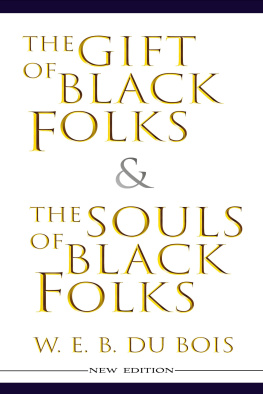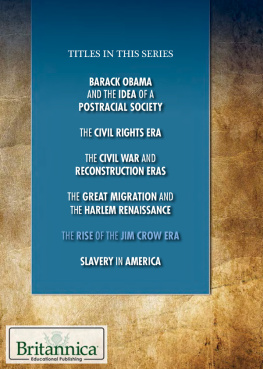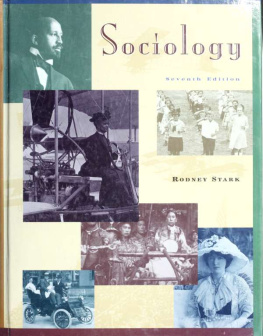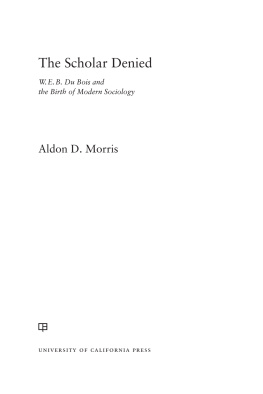
Segregation in America affected every aspect of life in the nation, including in academic research. Not unlike life outside the ivory tower, sociologists conducted research in educational and professional settings while subjected to a physical separation of the races. This segregation led to differences in the methodologies, understandings, and applications used between Black and White sociologists. As the field of sociology formed and grew, White sociologists gained prominence in the academy. Although a few early nineteenth century Black male sociologists rose to the top, scores of other lesser-known Black sociologists struggled for recognition in the field. Jim Crow Sociology: The Black and Southern Roots of American Sociology corrects these omissions bringing to light early Black men and women sociologists and LGBTQ sociologists.
One of the foremost leading scholars on W.E.B. DuBois, Earl Wright II looks at scholars from the Big Four; historically black colleges and universities (HBCU) whose major contributions substantially shaped the field of American sociology, as it is known today. Sociologists from Atlanta University, the first American school of sociology, Tuskegee Institutethe home of the first American program of applied rural sociology, Fisk University the driver of applied urban sociology and race relations research, and the intellectual touchstone of Black Sociology, Howard University were largely overlooked in seminal works of the discipline.
In Jim Crow Sociology, Wright II breaks open the seminal largely homogenous cannon to include the extraordinary contributions of unknown early Black sociologists, female sociologists and LGBTQ sociologists during the disciplines formative years. These sociologists, some marginalized, others completely erased, now for the first time, move to forefront to reclaim their lost legacy.

Earl Wright II is a professor of sociology at Rhodes College in Memphis, TN. He earned his Bachelor of Arts in History and his Masters in Sociology from the University of Memphis. In 2000, Earl earned a doctorate in Sociology at the University of Nebraska, where he founded a chapter of the Black Graduate Student Association. Over his career, Dr. Wright has served as faculty at the University of Central Florida, Fisk University, Texas Southern University (as chairperson of the Department of Sociology), the University of Cincinnati, and now, Rhodes College. His groundbreaking research has altered our understanding of the disciplines formative years in this nation. He is the author of The First American School of Sociology: W. E. B. Du Bois and the Atlanta Sociological Laboratory and What to Expect and How to Respond: Distress and Success in Academia.
Wright deliberately de-centers the normative whiteness that is tacitly embedded in the sociological canon, revealing the innovative theoretical and empirical foundations of sociology developed centrally in Black scholarly institutions. This work has the potential to transform the discipline; it should be required reading for all sociologists. Wendy Moore, Texas A&M University
The great strength of Jim Crow Sociology is its nuanced blend of emphasizing individual scholars and the institutional cultures and mandates situating the schools within which they worked. Wright does an extraordinary job of documenting the history of the formation of black sociology. Alford Young, Jr., Arthur F. Thurnau Professor, University of Michigan
Jim Crow Sociology is an inviting and progressive biographical narrative full of sociological debate. Bryan R. Ellis, Wayne State University
Jim Crow Sociology
Jim Crow Sociology
The Black and Southern Roots of American Sociology
Earl Wright II
About the University of Cincinnati Press
The University of Cincinnati Press is committed to publishing rigorous, peer-reviewed , leading scholarship accessibly to stimulate dialog among the academy, public intellectuals and lay practitioners. The Press endeavors to erase disciplinary boundaries in order to cast fresh light on common problems in our global community. Building on the universitys long-standing tradition of social responsibility to the citizens of Cincinnati, state of Ohio, and the world, the Press publishes books on topics that expose and resolve disparities at every level of society and have local, national and global impact.
University of Cincinnati Press, Cincinnati 45221
Copyright 2020
All rights reserved. No part of this book may be reproduced or utilized in any form or by any means, electronic or mechanical, or by any information storage and retrieval system, without written permission from the publisher. Requests for permission to reproduce material from this work should be sent to University of Cincinnati Press, Langsam Library, 2911 Woodside Drive, Cincinnati, Ohio 45221
ucincinnatipress.uc.edu
Published in 2020
Wright, Earl, II, author.
Jim Crow sociology : the Black and Southern roots of American
sociology / Earl Wright II.
Cincinnati : University of Cincinnati Press, 2020. | Includes
bibliographical references and index.
LCCN 2019045925 (print) | LCCN 2019045926 (ebook) | ISBN
9781947602571 (hardback) | ISBN 9781947602588 (pdf) | ISBN 9781947602595
(epub)
LCSH: Sociology--United States--History. | African American
sociologists--History. | African Americans--Social conditions. | African
Americans--Study and teaching--History.
LCC HM477.U6 W753 2020 (print) | LCC HM477.U6 (ebook) |
DDC 301.0973--dc23
LC record available at https://lccn.loc.gov/2019045925
LC ebook record available at https://lccn.loc.gov/2019045926
ISBN 978-1 -947602-57-1 (hardback)
ISBN 978-1 -947602-58-8 ( e-book , PDF)
ISBN 978-1 -947602-59-5 ( e-book , EPUB)
On the Cover: Dr. Ernest C. Withers, Sr. courtesy of the Withers Family Trust
Designed and produced for UC Press by Jennifer Flint
This book is dedicated to
My mother, Sandra K. Wright,
who is and will always be the wind beneath my wings.
My wife, Leslie L. Wright,
who has supported me like no one else and I am eternally thankful for all she has done.
My children, Chasity P. Fleming, Earl Tre Wright III, & Alexandria AJ Wright,
for being my inspiration and motivation to keep pushing forward even when challenges seem insurmountable.
Last, but certainly not least,
to the many unknown and forgotten men and women who contributed to the Atlanta Sociological Laboratory. It has been my lifes goal to bring as many of your names to the attention of the American public. When your names have not been available, I have attempted to bring your research accomplishments to the attention of the world. In these efforts I hope I have been successful and have represented your memories well.
With love and respect,
Earl Wright II














